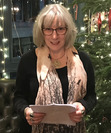Paula R.C. Readman's Blog, page 53
January 28, 2021
Clubhouse Guest’s Chat: Carmen Baca
Welcome to Clubhouse Chat page. Those of you who are not a member won’t be aware that the location of the Clubhouse is shrouded in mystery. The only way to visit it is via membership or an invite to the tearoom. Every few days, I’ll be sharing a conversation with all sorts of writers and authors at different levels of their writing careers. Over tea and cakes, or maybe a glass of something stronger, I shall be chatting with my guest about their work in progress, or latest book release.

Today, I’m chatting to the horror writer, Carmen Baca. Carmen taught high school and college English for thirty-six years before retiring in 2014. Her command of English and her regional Spanish dialect contributes to her story-telling style. Her debut novel El Hermano published in April of 2017 and became a finalist in the NM-AZ book awards program in 2018. Her third book, Cuentos del Cañón, received first place for short story fiction anthology in 2020 from the same program. To date, she has published 5 books and close to 50 short works in online literary magazines and anthologies. She and her husband live a quiet life in the country caring for their animals and any stray cat that happens to come by. Carmen, like myself is one of the writers featured in the Women of Horror Anthology, Vol 3 The One that Got Away published by Kandisha Press

Welcome to the tearoom, Carmen. May I start by asking you When you first began your writing journey, what drew you to your chosen genre?
First, I’d like to extend my gratitude to you for this opportunity for readers to get to know us—the authors who make up the women in horror. With a cup of strong coffee in hand, I’d like to answer your first question about my chosen genre.
I don’t have a chosen genre exactly, but I do have a chosen style: regionalism. I write in a variety of genres; but 90% of the time, I write those books and stories through regionalism, incorporating elements of my region and most especially my culture. I am drawn by the desire to entertain, inform, and educate my readers about my culture through the stories I write, whether they’re mysteries, paranormal, horror, or any of the other genres I’ve written.
What writing elements do you think are your strongest points, and what would you like to do better?
My use of the elements of regionalism and tone are my strong points, at least I think so. I love incorporating my culture’s customs, traditions, superstitions, etc. of what I experienced in my youth which have died out and which today’s and future generations will never know. Creating a certain tone in my works is also something I work at through scrupulous choice of diction and syntax. I love creating a spooky atmosphere just as much as a religious or festive one, so my readers experience the emotions I strive to evoke in them as they read. There is one skill I’d like to master, which is changing my voice to suit the genres I tackle. I’ve done this successfully a few times, but it’s something I’d like to be able to do effortlessly.
 Carmen Baca
Carmen Baca
Tell us a little about your latest writing project. Is it a new idea, or one you have been mulling over for some time?
I’m close to finishing my sixth book, which was inspired by one of my readers who is also a writer. Because most of my books are set in the ’50s and ’60s and because of my use of regionalism, they serve as a record of what life was like in those eras, especially for us Hispanics living in the southwest region. That woman, Caroline Vigil, told me once she’s saving my books for her grandchildren, so they will learn of those traditions and other elements of our culture which are no longer practiced. The book is my first attempt at a new genre: YA. I refer to as an Alice in Wonderland adventure through Tales from the Crypt. The main character finds herself in a world inhabited by her ancestors who introduce her to the supernatural creatures and folktale characters of my culture. Because they are evil, dark, ghostly, or deadly, the atmosphere at times takes dangerous turns I hope will surprise the reader.
How many unfinished projects do you have on your computer?
I have four books and about six short stories waiting their turns. All but two will wait a bit longer because I’m anxious to work on a couple for specific reasons. One is a sequel and the other is a companion book for my fifth, La Quinceañera. Both feature antagonists who emerged from La Quinceañeraand who became powerful female horror characters. They require their own books.
Choosing only five of your favourite authors. Can you list them in order 1 begin the top of your list and say how have they influenced your writing?
Only five is a bit difficult, but here goes:
Shakespeare—he influences my use of general nature, the depiction of the stages of life, emotions, and experiences of every human—the human experience.
Milton—his concept of man’s creation, the unholy trinity, and the function of the conscience guide many of my works or insert themselves into my themes.
Dickinson—her themes and some of her concepts also find their way into many of my stories (death, success, hope, aloneness, among others).
Yann Martel—his mastery of the metaphysical conceit (aka extended metaphor) influences my own use of this literary device to set the tone of scenes, chapters, or entire works.
Rudolfo Anaya—my former advisor, may he rest in peace, taught me the value of embracing and making the most of writing through regionalism, creating my own idioms, and conveying our culture through literature.
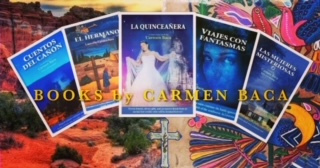
Were any of your characters inspired by real people?
Almost all the characters in my first book are real people because it’s based on a true story. Since then, many of the characters I created and still create are based real people or have traits I borrow from people I know or have known.
What did you learn when writing your book? In writing it, how much research did you do?
For my first book, I learned so much more about the religious brotherhoodwhich was a big part of the storyline. I am the curator of the brothers’ records dating back to 1850 and their religious artifacts, so I have most of what I needed in my home. My mother, the historian of our family, also left many records of our ancestry and traditions which I incorporated into that book.
Each book I write requires research for historical accuracy or for other elements I include. I research as I write, so google is a good writing buddy I rely upon. However, I have my own library of resources I use constantly, like New Mexico plants and herbal remedies. I learned about ghosts and their ghostly presence for the second book; I learned about the Great Alaskan Earthquake of 1964 and found a blog of survivors who supplied details for the experience of being in an earthquake. I discovered new folktale characters and creatures to incorporate into my third book, and I found many New Mexico outlaws to choose from for the fourth book. I learned about the tradition of the Quinceañera for book five and also learned about a new genre I never knew about. Writing teaches me something new almost every day.

Did you uncover things about yourself while writing your books or stories, whether that be a long forgotten memory, a positive experience etc.
For the first book, many childhood memories came back to me and provided a bit of introspection about myself regarding my youth. Most of what I’ve uncovered comes from the non-fiction stories, essays, and articles I write between books. Some of the memories are unwelcome and painful, but writing about them and sharing them with readers makes me realize I’m not alone because they’ve gone through similar human experiences.
How do you select the names of your characters? Do you know everything about them before you start writing their story?
I select many of the names of my characters from the old names from my culture. Many are archaic, and since I write about elements of my culture I don’t want forgotten, the names are part of that. Some character names are symbolic or allegorical to suit the story lines. Take my most current antagonist, Atlaclamani Ahuatzi, an Aztec woman who needed a powerful name. A special character is a boy named José María from a previous story. Hesettled in a community called Rey Salvador (King Savior); his story is an allegory of Christ’s. Some names are more relevant than others to suit the characters.
How long on average does it take you to write a book or story?
My first five books took two months each to write. My sixth is going a bit faster, perhaps because the inspiration for it is strong. My short stories take anywhere from a few hours to a few days before I submit them to publications. I love the satisfying feeling of bursting with inspiration to start a new project, even as I’m finishing the one before.
Thank you for joining me in the tearoom, Carman.
To find out more about Carman’s books and writing click on the link below:
If you want to find out more about Clubhouse Members’ Books, don’t forget to check out the Clubhouse Bookshops, too.
Clubhouse Guest’s Chat: Ushasi Sen Basu
Welcome to Clubhouse Chat page. Those of you who are not a member won’t be aware that the location of the Clubhouse is shrouded in mystery. The only way to visit it is via membership or an invite to the tearoom. Every few days, I’ll be sharing a conversation with all sorts of writers and authors at different levels of their writing careers. Over tea and cakes, or maybe a glass of something stronger, I shall be chatting with my guest about their work in progress, or latest book release.


Today, I’m chatting to the horror writer, Ushasi Sen Basu, an author who lives in Bangalore, India. Ushasi, like myself, is one of the writers featured in the Women of Horror Anthology, Vol 3 The One that Got Away published by Kandisha Press

Welcome to the tearoom, Ushasi. I hope your flight in the clubhouse was enjoyable as we try to provide the best service for all our guests. My first question to all my guests is what would you like to drink?
A private jet plane in was quite unexpected, Paula. The tearoom is amazing. A coffee, and hopefully cookies on the side would be lovely, thank you.
Now we have our refreshments I’ll start by asking you, when you first begun your writing journey what drew you to your chosen genre?
I suppose I am a mystery writer now, since I have published that genre the most; though I write all kinds. I gravitated towards writing mysteries because I’ve always enjoyed reading the genre, and I feel human nature lends itself to deception and lies. I’ve always felt I have a radar for deeper undercurrents, and though I do nothing with this ‘skill’ of mine, I write about people who do.
Which writing elements do you think is your strongest points, and what would you like to do better?
I would count writing dialogue among my skills, and the ability to keep the pace of narrative going at a brisk trot. Descriptive writing, and language that can be savoured like poetry is a skill I envy in other writers and would like to develop.
 Ushasi Sen Basu
Ushasi Sen Basu
How many unfinished projects do you have on your computer?
Haha, anything between 3 to 5 I would guess! But I’ve accumulated these over many years. I try to see all my writing through to the end, but there are some I have kept aside to revisit and polish up more.
Do you write a synopsis first or write the first chapter? If you only write short stories, do you plan your story or let the characters lead you?
I start writing and let the characters do their thing. It works well for me. The few times I’ve written a plotline before beginning a book, I have either departed entirely from it or have felt so hopelessly committed to staying to the outline that it became more a burden than an aid.
When reading your work through do you ever find that your daily mood swings are reflected in your writing?
This is an interesting question. I can’t say that it does. Except that I might prefer to write introspective passages on a day it reflects my state of mind, and the more vigorous ones on others. When I am too low, I cannot write at all. I feel utterly blocked, so black moods don’t show up on the pages at all.
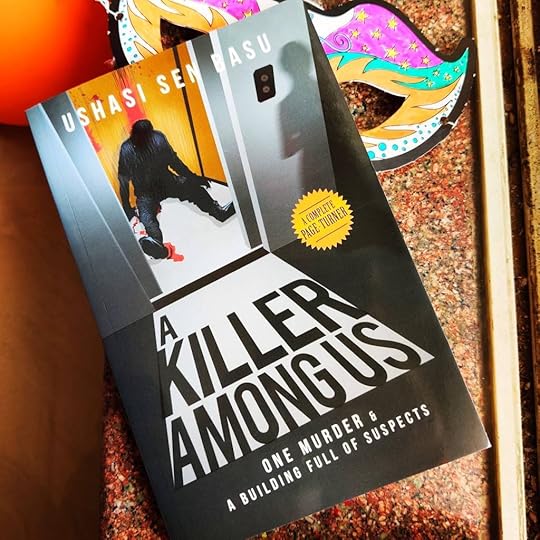
Were any of your characters inspired by real people?
They very often are, but each character is always an amalgam of many people I’ve encountered. Very rarely a single person.
What is your work schedule like when you’re writing?
I wait for the house to quiet down, with people leaving for work or school and then I begin to write and try to cover as much ground as I can. I unfortunately am still not in that class of writers who can expect to be given a secluded cabin to write in.  Someday perhaps. Till then, I hope every morning that it would be a good day when my fingers fly over the keys and I have a good 3000 words in by the time people begin to demand my attention again.
Someday perhaps. Till then, I hope every morning that it would be a good day when my fingers fly over the keys and I have a good 3000 words in by the time people begin to demand my attention again.
Do you set yourself a daily word count?
Not an exact one, but I am always conscious of the fact that it would be great to have about 3000 done by the end of the day. But those words only count if it takes the story forward. If I keep a word count too much in mind, sometimes it happens that I babble just to fill up the quota and then have to trash it all eventually. That is a criminal waste of time.
How many hours in a day do you write?
I get too distracted (especially after the pandemic hit) by other things on the net. (Damn you, Netflix and YouTube!) Though ideally, I should have a good 6 hours on days I have no other work to attend to (I am a freelance editor and writer too); it ultimately comes down to about 3 hours. I have to find my focus again. Hopefully 2021 will help me start afresh.

What was your hardest scene to write?
I am very bad at writing romance. It is an established fact. But sometimes, the story demands a hint of romance, so I have to go out in my suit of armour and do battle with those scenes.
How long on average does it take you to write a book or story?
Both my books took roughly 5 to 8 months to write. I have never been able to write exclusively, since I freelance as well.
Thank you for joining me in the tearoom, Ushasi. If you would like to find out more about Ushasi’s writing and books please check out the links below:
Facebook: https://www.facebook.com/ushasikathputli/
Linkedin:https://in.linkedin.com/in/ushasi-sen-basu-204210a
Blog: https://ushasisenbasu.com/
If you want to find out more about Clubhouse Members’ Books, don’t forget to check out the Clubhouse Bookshops, too.
Clubhouse Guest’s Chat: Vanessa Grossman
Welcome to Clubhouse Chat page. Those of you who are not a member won’t be aware that the location of the Clubhouse is shrouded in mystery. The only way to visit it is via membership or an invite to the tearoom. Every few days, I’ll be sharing a conversation with all sorts of writers and authors at different levels of their writing careers. Over tea and cakes, or maybe a glass of something stronger, I shall be chatting with my guest about their work in progress, or latest book release.

Today I’m welcoming Vanessa to the tearoom. Welcome.
My apologies for the delay in my visit, Paula. Everything seems to take me seventy times longer with this pandemic going on.
We do understand, but we are very luck in the clubhouse, that we are not affected by what’s happening outside our borders. First let sort out our drinks, shall we?
Could I have a chai tea, please.
Of course you may. Let’s start by asking you when you first begun your writing journey what drew you to your chosen genre?
From my earliest days, it has always been fantasy fiction. My mother read The Hobbit and The Chronicles of Narnia to me when I was about five and I’ve been lost in magical and spooky worlds ever since.
Which writing elements do you think is your strongest points, and what would you like to do better?
I build worlds that I think are unique and intriguing. I do a good job throwing in unexpected, charming details that make the setting come to life. I would like to get better at creating undercurrents of tension that keep the reader roped to the story from beginning to end.
Tell us a little about latest writing project. Is it a new idea, or one you have been mulling over for some time?
I’m working on a dark fairytale called The Tale of the Two-Faced Witch. It has scientists, a coven of witches and a clockwork house. It’s a relatively new idea. I’ve been asking myself what kind of books I want to be writing and this came out of that soul-searching
 Vanessa Grossman
Vanessa GrossmanHow many unfinished projects do you have on your computer?
Right now, there are 4: The first book and a half of a trilogy called The Greatest Deviation, then there’s The Two-Faced Witch, and another dark fairytale called White Vixen. I also have a mile-long memo on my phone that has six or seven other half-baked ideas.
Do you write a synopsis first or write the first chapter, or let the characters lead you?
I usually start with a short synopsis laying out major plot points and characters. After I’ve written the first few chapters, I usually go back and make a more detailed outline. I use Scrivener for writing and my “Research” folder is always stuffed with notes and descriptions.
Choosing only five of your favourite authors. Can you list them in order 1 begin the top of your list and say how have they influenced your writing?
Margaret Atwood – I am obsessed with the way she creates everyday settings with elements of the fantastic woven in. She has a way of creating an undercurrent of pain for her characters that is so engaging for me. Her visions of the future are disturbing and uncomfortably possible.Mervyn Peake – Titus Groan is my favorite book. Peake creates an encapsulated world that is filled with characters you find yourself both horrified by and yet deeply in love with. He is unabashedly weird and his illustrations are charming.Richard Adams – His books are straight up emotionally scathing. I’ve never read something by him that left me unchanged. I’ve never been able to read any of his books more than once, knowingly putting myself and the characters back through their agonizing journey. Yet, each of his books lingers in my memory with crystal clear detail in a way very few others can do.Jeffrey Ford – The way he unfolds his Well Built City and reveals his deeply flawed and often morally repugnant characters is amazing. His plots unfold slowly and take unexpected turns. I wish I could write stories half as dripping with menace and pathos.Lois McMaster Bujold – Her stories move in an unadorned and linear fashion, usually with a single POV and a main character with a clear and well-developed voice. I admire her uncluttered stories and atypical main characters. (Middle-aged women galivanting through the wilderness and solving supernatural mysteries? Yes, please!)Were any of your characters inspired by real people?
Most of my female characters reflect aspects of myself. In The Underwest, Alma’s anxiety and lack of a voice of her own is very much how I remember being at that age. Her brother Waylon, who has autism, has some similarities to one of my brothers (and to my daughter, who is very much like him). Neither of them have autism, but they both have deeply introspective personalities that others often fail to understand.

What did you learn when writing your book? In writing it, how much research did you do?
I enjoy the research aspect of novel writing. My stories are usually set in the Industrial Revolution era. I did a lot of research on manufacturing and industry, steam power and tried to gain a rudimentary understanding of engines and clockworks. I also research any disorders or illnesses I give my characters because I don’t want to perpetuate stereotypes. For The Underwest, I learned a lot about epilepsy.
What is your work schedule like when you’re writing?
With the pandemic, the flow of my days has changed enormously. I usually work on my day job early in the morning, home-schooling mid-morning and then after lunch, I usually have a few quiet hours to myself. That’s when I do the most writing. That and any time there’s football being watched on the TV.
How do you select the names of your characters? Do you know everything about them before you start writing their story?
I LOVE naming characters, places, creatures, plants, breakfast cereals, anything! When I need to name something, I let my brain go quiet and the name just sort of floats up out of the abyss. I usually know very little about my characters when I start writing and get to know them as I go.
Thank you so much for joining us. when you are ready to leave Brutus will be waiting to take you.
If you want to find out more about Clubhouse Members’ Books, don’t forget to check out the Clubhouse Bookshops too.
January 26, 2021
Clubhouse Guest’s Chat: Stevie Kopas
Welcome to Clubhouse Chat page. Those of you who are not a member won’t be aware that the location of the Clubhouse is shrouded in mystery. The only way to visit it is via membership or an invite to the tearoom. Every few days, I’ll be sharing a conversation with all sorts of writers and authors at different levels of their writing careers. Over tea and cakes, or maybe a glass of something stronger, I shall be chatting with my guest about their work in progress, or latest book release.

Today, I’m chatting to the horror writer, Stevie Kopas. Stevie was born and raised in New Jersey. She is a gamer, a writer, reviewer, and an apocalypse enthusiast and currently resides in East Tennessee with her husband, son, and stinky old dog. She is the author of bestselling dystopian series The Breadwinner Trilogy, Never Say Die, Slashvivor, and other bodies of work. Stevie, like myself , is one of the writers featured in the third volume of Women of Horror Anthology, The One that Got Away published by Kandisha Press

Welcome to the tearoom, Stevie. The first question I ask all my guests is what would you like to drink?
Thank you for my invite to the tearoom. It’s an amazing place. I never turn down a good cup of coffee and might even be a bit of a caffeine addict.
Now we have our drinks let’s start by asking you, when you first begun your writing journey what drew you to your chosen genre?
I’ve always been connected to horror, whether it be through watching old horror movies or playing horror video games with my dad or reading Goosebumps and Fear Street through the night growing up. It’s always been my go-to and I’ve always had a healthy relationship with fear and reality so I feel like that’s also why I love commentary and reviewing the genre.
Tell us a little about latest writing project. Is it a new idea, or one you have been mulling over for some time?
My latest writing project is a little bit of a secret as it’s something that just bloomed out of nowhere. It’s sort of a new idea, but it’s also drawing from another project of mine that’s already out there. Is it a sequel, a prequel, a spin-off, a standalone story? There’s no telling, I guess everyone will have to wait and see!
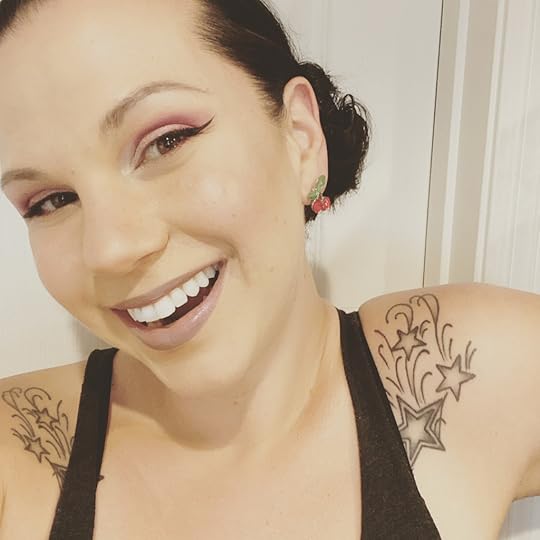 Stevie Kopas
Stevie Kopas
How many unfinished projects do you have on your computer?
Good God, like seven.
Do you write a synopsis first or write the first chapter? If you only write short stories, do you plan your story or let the characters lead you?
I kind of write a basic outline with major plot points and then as I’m writing the story and characters kind of evolve on their own and take me on a journey to places that I sometimes never even planned on taking the story.
Were any of your characters inspired by real people?
Absolutely! A few of my villains have been inspired by particularly hateful, rude or nasty customers that I’ve interacted with over my years in retail. I’ve also written characters based on different personality parts of friends or frenemies. It’s a lot of fun to take a piece of someone and almost like, grow it in a lab.
Is there anything about you your readers might be surprised to find out?
I am zero percent nostalgic.
What is your work schedule like when you’re writing?
Well, between working and chasing my son around, I don’t have much of a writing life these days unless I dive into the pits of last minute, under the wire desperation and manage to eek something out by the deadline. Needless to say schedule… what schedule?

How many hours in a day do you write?
Not nearly enough, and as with everything else, I wish there were more hours in a day so that I could accomplish more. Time management is not my strongest trait I suppose.
How do you select the names of your characters? Do you know everything about them before you start writing their story?
Almost all of my characters have been names of video game characters. I guess I let the character take their own shape as things go on.
How long on average does it take you to write a book or story?
Before my son, probably a few months. Now, I’ll probably finish my next book in five years lmao.
Thank you so much for joining in the tearoom, Stevie. If you would to find out more about Stevie’s writing and books please check out the links below.
Twitter @apacotaco, Instagram @theapacotaco Facebook: facebook.com/thebreadwinnertrilogy
Official website/blog is http://someonereadthis.com
If you want to find out more about Clubhouse Members’ Books, don’t forget to check out the Clubhouse Bookshops, too.
January 25, 2021
Clubhouse Guest’s Chat: Janine Pipe
Welcome to Clubhouse Chat page. Those of you who are not a member won’t be aware that the location of the Clubhouse is shrouded in mystery. The only way to visit it is via membership or an invite to the tearoom. Every few days, I’ll be sharing a conversation with all sorts of writers and authors at different levels of their writing careers. Over tea and cakes, or maybe a glass of something stronger, I shall be chatting with my guest about their work in progress, or latest book release.
 Photo by Engin Akyurt on Pexels.com
Photo by Engin Akyurt on Pexels.comToday, I’m chatting to the horror writer, Janine Pipe. Janine, like myself, is one of the writers featured in the Women of Horror Anthology, Vol 3 The One that Got Away published by Kandisha Press

Welcome to the tearoom, Janine. My first question to all my guests is, what would you like to drink?
Thank you for the invite to this amazing tearoom. My fave drink is a peppermint mocha, please.
Let’s started by asking you, when you first begun your writing journey what drew you to your chosen genre?
Well, I have always written, since school really but never seriously and not for public consumption. Not my fictional work anyway. About 10 years ago, I started to do some travel writing, mainly in regards to Florida and theme parks. Although it was factual, it really gave me the bug again. Then, about 2 years ago, I lost my job and decided that somehow fate had intervened and that I would write a book. Well, I sat in a beautiful garden in the middle of France and wrote 2 maybe 3 chapters of complete drivel and decided that a novel might be a tad ambitious. The rest as they say, is history.
Which writing elements do you think is your strongest points, and what would you like to do better?
I think that I do well at creating interesting plots and workable twists. I have a decent grasp of grammar from having worked in a school. And a high standard of vocabulary. But I definitely need to get better at fleshing out my longer stories and working on consistency. At the moment, shorts are my strongest work but I want my novellas to reflect a similar path. And if that doesn’t work, I guess I can just write a collection of shorts.
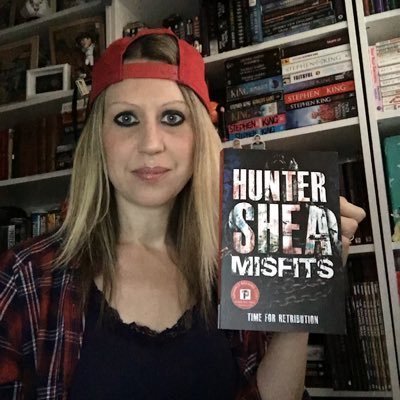 Janine Pipe
Janine Pipe
Tell us a little about latest writing project. Is it a new idea, or one you have been mulling over for some time?
So my latest project is an 80’s slasher but set in the UK on the moors rather than the usual American camp or wood setting. And it is a newish idea which was inspired and encouraged by Cameron Roubique who really wanted me to write something set in the 80’s. After reading some of his slasher novels, and becoming friendly, he agreed to help me with some of the planning. It has had a rather slow start due to the UK being back in full lockdown but the initial thoughts and characters are taking shape, at least in my head. I will be sharing exclusive bits and pieces with my patrons too.
Do you write a synopsis first or write the first chapter? If you only write short stories, do you plan your story or let the characters lead you?
I am a real pantser. I have a rough idea of where I want the story to go and what it will involve but often I just write and see what happens especially in regards to the characters. Sometimes even I am surprised with how it pans out. For longer work though I do try to work to a bit more of a plan, just because as I tend to waffle in real life, I tend to waffle in stories and suddenly have 10 pages of complete drivel which has nothing whatsoever to do with the plot.
Choosing only five of your favourite authors. Can you list them in order 1 begin the top of your list and say how have they influenced your writing?
Ooooh yay! Here are my 5 most fave although I have a ton more.
Glenn Rolfe – encourages me and believes in me. Has influenced me by writing amazing creature features, coming of age and setting things in Maine. Awesome.
Hunter Shea – another writer who I could read all day and never get bored of. He has influenced using humour in my work.
Tim Meyer – the way he can mix thriller and horror is amazing.
Cameron Chaney – Cameron’s voice is just beautiful. I love everything about the way he writes. His work makes me cry and fills my heart with joy. I also adore the sense of nostalgia it evokes.
Dennis Lehane – Lehane is my favourite mainstream author. His dark thrillers are terrifying, proving time again for me that humans are the worst kind of monster. Again he sets his work mainly in Boston which is a city close to my heart.
Is there anything about you your readers might be surprised to find out?
Those who don’t know me personally and read some of my darker stuff would likely be surprised to know how much I love Disney and that I am like a kid when I am in one of the parks. I am also a bit of an obsessive down to ensuring we wear matching clothes dependant on which characters we were meeting that day. It takes military precision to plan an effective WDW holiday.
What is your work schedule like when you’re writing?
I tend to write when I can, I don’t and can’t really have a schedule. When I can, I write in the afternoon. I work in the morning or until I finish the day’s gig (I am actually a freelance writer) and I get tired very easily so I wouldn’t likely produce the best I could in the evenings. Weekends when my husband is home is also a good time to lock myself away, although that is often filled with booktube, review and podcasting duties too. You’d think being home all day long would be ideal for an author, but when you’re working, home-schooling and sharing space, it bloody isn’t.
Do you set yourself a daily word count?
I did during NaNoWriMo and when the world isn’t messed up and life gets back to some sense of normality, I will again. But I can’t do that right now. Sometimes I am lucky to find the time to jump in the shower let alone make words happen on the screen. I also don’t work well creatively under stress and pressure. I find if I *have* to write then the ideas just won’t flow … same with editing. I can stare at a screen for hours and not change a damn thing if I need to do it. If I just fancy pottering for a bit, I can knock out several thousand words. Typical.

How do you select the names of your characters? Do you know everything about them before you start writing their story?
I have a group of favourite names that I can’t help but use over and over and then I often end up choosing names of people I know. For example, my story for TOTGA features one of my favourite’s – Adam and also another favourite – Jack who is also named for one of the Final Guys, Jack Campisi. In one of my as yet unpublished novellas, I have an MC called Cameron after my very good friend Cameron Chaney. And my latest novella which is the 80’s slasher, will have a Ben (after another good buddy, Ben Long) and an Alex (after reviewer buddy Alex Pearson). I actually find female characters much harder to name.
How long on average does it take you to write book or story?
There is no average really. It just totally depends on timing. I have been known to write an entire story that was good enough to be accepted in a day, and others have taken weeks just because of having to find minutes here and there to add to it and edit.
Thank you for joining me in the tearoom, Janine. If you would like to find out more about Janine’s writing and books check out the links below:
Blog – https://wordpress.com/home/janinesghoststories.wordpress.com
YouTube – https://www.youtube.com/channel/UC32B_iUm0Kxy95mcsPfr-QQ
Podcast – https://youtu.be/QQmfYggNKx0
Patreon – https://www.patreon.com/creator-home
Amazon page – https://amzn.to/3shavkZ
If you want to find out more about Clubhouse Members’ Books, don’t forget to check out the Clubhouse Bookshops, too.
Creating A Flow
I’m so excited. My new supernatural crime novel ‘As The Crow Flies’ is flowing nicely. I’m on Chapter 3 of the first draft and I’m hoping to write at these three more chapters by the end of the week.
The first draft is a case of getting the story down, so I have something to work with as the story develops.
I’ve been a little worried about how I was going to bring in the supernatural elements to the story without it being crass, or jarring the flow of the plot. Last night, whether it was in my dream, or my brain was still processing the problem while my body slept the idea came to me.
It will need plenty of work to make it sit comfortably within the flow of the plot, but it will allow me to tell Granny Wenlock’s background story as her many great grandson solves the next murder, mystery and mayhem in As the Crow Flies Granny Wenlock’s next adventure
For more details about the idea behind As The Crow Flies check out this link to my previous blog post :
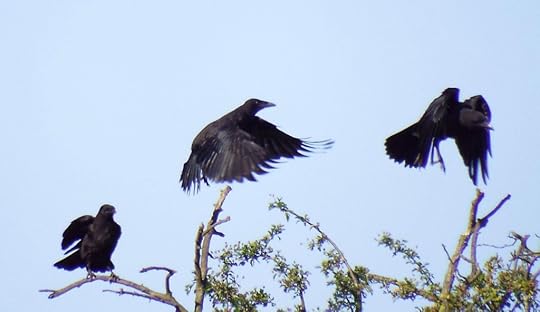
January 24, 2021
Clubhouse Guest’s Chat: Sonora Taylor
Welcome to Clubhouse Chat page. Those of you who are not a member won’t be aware that the location of the Clubhouse is shrouded in mystery. The only way to visit it is via membership or an invite to the tearoom. Every few days, I’ll be sharing a conversation with all sorts of writers and authors at different levels of their writing careers. Over tea and cakes, or maybe a glass of something stronger, I shall be chatting with my guest about their work in progress, or latest book release.
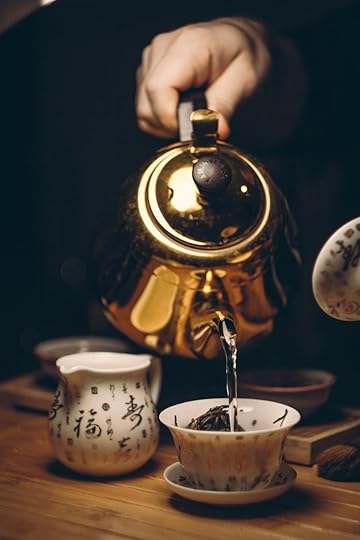 Photo by NIKOLAY OSMACHKO on Pexels.com
Photo by NIKOLAY OSMACHKO on Pexels.comToday, I’m chatting to the horror writer, Sonora Taylor. Sonora is the award-winning author of Little Paranoias: Stories, Without Condition, The Crow’s Gift and Other Tales, and Wither and Other Stories. Her short stories have been published by Camden Park Press, Kandisha Press, Cemetery Gates Media, The Sirens Call, Tales to Terrify, the Ladies of Horror fiction podcast, and more. Her latest book, Seeing Things, is now available. She lives in Arlington, Virginia, with her husband and a rescue dog. Sonora, like myself, is one of the writers featured in the Women of Horror Anthology, Vol 3 The One that Got Away published by Kandisha Press

Welcome to the tearoom, Sonora Taylor. My first question to all my guests is what would you like to drink?
Thank you for invite me, Paula. Please could I have a 20-year-old pu-erh tea, black, thank you.
Now we have our refreshments, can I start by asking you, what writing elements do you think are your strongest points, and what would you like to do better?
I believe my strongest writing suit is dialogue. The easiest portions of my work to sit and write are the scenes where two characters are talking to each other. I tend to think in thought and response all at once, and thus it’s almost second nature to craft my characters talking to each other–and by letting the characters talk it out, they sometimes surprise me with what they’re actually like!
In turn, I would like to be better at setting a scene or describing the sense of place. I often find the set-up to be the hardest thing to write because I’m so eager to jump straight to the action. Also, I know all about where they live, what they look like, etc.–why do I need to spend time on it? Of course, it’s because I’m currently the only one that knows that, ha ha. But I have to convince my brain to sit down and spell all that out to make the story flow at its smoothest.
Tell us a little about your latest writing project. Is it a new idea, or one you have been mulling over for some time?
My story, “From Scratch,” was an idea that was inspired by a call for food-themed horror. I wanted to explore how someone with dangerous impulses could channel them through the safer hobby of cooking–and how that hobby may not be as safe for her as it is for others, since the viscerality of cooking seems to only trigger her further. It’s especially ironic in a time where a lot of us have worked on sharpening our kitchen skills in order to ease our anxiety.
How many unfinished projects do you have on your computer?
At least five, ha ha. Most of them are short stories I’ve started and need to finish ahead of giving my editor the full manuscript for my next short story collection.
Do you write a synopsis first or write the first chapter?
I write–I’m a pantser through and through. I’ll sometimes write a note for myself if I’m in the middle of another project, but the best way for me to plan my stories is to write them. They almost always change from what I first envisioned anyway!
What did you learn when writing your story? In writing it, how much research did you do?
That cooking can be very gross when described in detail! Ha ha. I love to cook and I had fun turning its more visceral aspects into something disgusting. I’m a vegetarian, so I especially had fun talking about how nasty cooking meat can be–I ate meat until I was 20, so I do have some experience cooking and preparing it.
 Sonora Taylor
Sonora Taylor
Is there anything about you your readers might be surprised to find out?
Given how I write parent-child dynamics, they may be surprised to know I have a great relationship with my parents and also had a happy childhood.
What is your work schedule like when you’re writing?
I write when I can. I try to write a little bit each day–even if it doesn’t amount to much in quantity, it’s better than nothing. I do have a day job and so I have to balance both. Funny enough, I don’t like writing on weekends because I do consider it to be work.
How do you select the names of your characters? Do you know everything about them before you start writing their story?
I usually go with a name that feels right. I’ll sometimes change it partway through. I never know everything about them before I write their story. That’s part of the fun for me, being surprised by my characters as I write.

What was your hardest scene to write?
It was less a single scene and more figuring out what the climax would be. I initially intended to go beyond the final scene into something frightening, though I couldn’t figure out what that would be without the story getting cheesy. I brought a draft of the story to a writing group I was a part of, and one of the members suggested I could end with the scene I’d written up to; which in turn gave me the idea to flesh out the middle. The story came much easier after I approached the story that way. This is also a plug to find a writing group or at least a trusted reader to help you with your stories, even if you think you don’t need one. You do! And we all get feedback and assistance–you don’t have to go at every story alone.
How long on average does it take you to write a story?
It usually takes me at least 2-3 weeks to write a story so long as I’m consistently working on it. Sometimes it’s faster if I have a strong compulsion to write, but usually, I get better character development and a more satisfying story arc if I work on it a little at a time and get to know my characters as the story progresses.
Thank you for joining me in the tearoom, Sonora. If you like to find out more about Sonora’s writing and books please check out the links below:
Blog: https://sonorawrites.com/blog/
Goodreads: https://www.goodreads.com/author/show/17015434.Sonora_Taylor
If you want to find out more about Clubhouse Members’ Books, don’t forget to check out the Clubhouse Bookshops, too.
Clubhouse Guest’s Chat: R. A. Busby
Welcome to Clubhouse Chat page. Those of you who are not a member won’t be aware that the location of the Clubhouse is shrouded in mystery. The only way to visit it is via membership or an invite to the tearoom. Every few days, I’ll be sharing a conversation with all sorts of writers and authors at different levels of their writing careers. Over tea and cakes, or maybe a glass of something stronger, I shall be chatting with my guest about their work in progress, or latest book release.

Today, I’m chatting to the horror writer, R. A. Busby. R. A, like myself, is one of the writers featured in the Women of Horror Anthology, Vol 3 The One that Got Away published by Kandisha Press
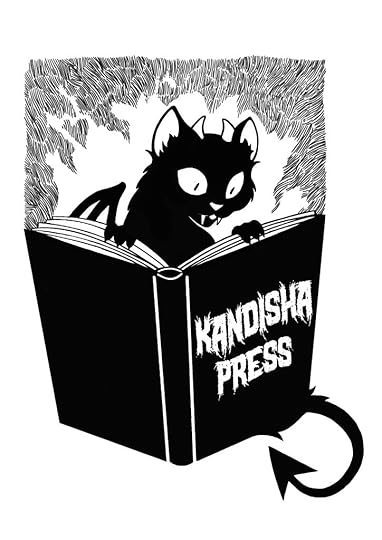
Welcome to the tearoom R. A. My first question to all my guests is what would you like to drink?
Thank you for your invite to the tearoom. It was exciting arriving here. Could I have a coffee, please. My story in, The One that Got Away, is the “Kiss”. I’m looking forward to seeing it published.
Me too. It’s a very exciting time. Right now we have our refreshments, can you tell us a little about your latest writing project. Is it a new idea, or one you have been mulling over for some time?
I first conceived the basic premise of “Kiss” when I saw a painting by the Italian artist Pietro Longhi (see below). Although the picture is sometimes called “The Rhinoceros,” what caught my eye was not the rhino, but the woman in the back looking at the exotic spectacle. She’s in a dark mask that covers just her eyes, nose, and mouth, and seems oddly to have no laces or ties, and I later found that this type of mask is held between the teeth by a button. Her face seemed swallowed in darkness, and I thought how unsettling it was, and then thought, “What if that were her actual face?”
How many unfinished projects do you have on your computer?
I have about two, a story that I’m not completely happy with–it’s a cool concept, but somehow I don’t have the necessary pieces to make it work yet–and many drafts of a novel that needs to sit on the back burner and simmer for awhile.
Do you write a synopsis first or write the first chapter? If you only write short stories, do you plan your story or let the characters lead you?
For short stories, which is most of what I’ve written (so far), I need to find the climax of the story first, the ultimate place where things will come to a head–and of course, I need to know how they’re going to turn out. From there, I can plan more or less backward for how they got there. For short stories, I’ll have a very rough synopsis–beats I need to hit, ideas I need to include. Then I’ll try to hit them. Sometimes, the story moves in a different direction than I’d anticipated, but that’s fine.
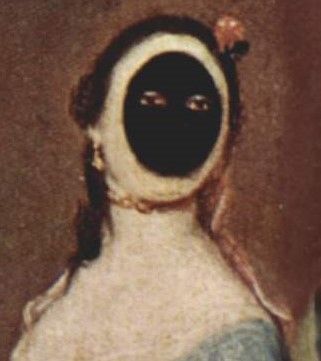 R. A. Busby
R. A. Busby
Choosing only five of your favourite authors, (Poet, Playwright, or Screen writer). Can you list them in order 1 begin the top of your list and say how have they influenced your writing?
You realize this is like asking to choose one’s favorite child? Okay, for horror specifically, I love the works of Shirley Jackson. Along with other writers such as Amparo Dávila (WHOM EVERYONE SHOULD READ, JUST SAYING) and Charlotte Perkins Gilman, Jackson is brilliant at depicting an internal emotional state. From the outside, her books don’t look traditionally scary. Think about Hill House: A bunch of folks go to a house, there are some weird sounds and writing on the wall, and then the main character leaves (or tries to). It’s the opposite of splatterpunk. I’m not against splatterpunk per se, but I find myself drawn to horror that’s more internal and psychological.
For film directors/screenwriters, I’m blown away by the work of Jordan Peele, Ari Aster and Robert Eggers, all of whom have completely rewritten what modern horror films look like and have given them an internality and a resonance and depth that the genre absolutely needed.
Finally, an unequalled author whose work I find humbling and profoundly life-changing is Toni Morrison. Not only did Morrison write the greatest American horror novel, but the greatest American novel, period. In Beloved, Morrison’s fluid sense of time, the permeability of the present by the past, and above all, her very true and horrifying literalization of the fact that America is a society haunted by slavery make Beloved a novel I will never fully grasp but must come back to again and again. I’m grateful to have been given the opportunity to read her work.
 The Kiss (inspiration)
The Kiss (inspiration)When reading your work through do you ever find that your daily mood swings are reflected in your writing?
No; as a matter of fact, I go to my writing (often) to change my daily mood swings, particularly since the beginning of the pandemic. I realize it might sound absurd, but writing about eating someone else’s foot or giving birth to a baby with cholla thorns for teeth is better than worrying about the virus. Like, “Hell, yeah, sign me up for that.”
Were any of your characters inspired by real people?
I think like all authors, I write characters who are an amalgam–a bit of this, a bit of that. Some have traits or elements in common with folks I know, but no single character is a straight 1:1 version of an actual person.
What did you learn when writing your book or story? In writing it, how much research did you do?
For “Kiss,” I ended up doing a bit of research on both the Italian mask I saw in the Longhi painting, but also on New Bedford, a city I love (unlike Dr. Eliot, the main character in my story.) I wanted to find some photographs from around the early 1900s, which is when the story is set, so that I could have that sense of verisimilitude in writing the story. I’ve visited New Bedford many times, and as a child of the Southwest, I’m always amazed at the age and solidity of the buildings there. The photographs I found looked very similar in many respects to the city I knew, but it’s also where I learned that the cobblestones are called “setts,” so I included that detail.
How do you select the names of your characters? Do you know everything about them before you start writing their story?
I try to give my characters names which reflect some aspect of the story’s theme or their own essential personality. One of my favorite character’s names was for Nadie Denneby, the main character of my story “Bits,” (Short Sharp Shocks! #43 about a woman whose body parts start inexplicably start falling off. The name “nadie” is a Spanish pronoun meaning “nobody,” and “Denneby” is a slight corruption of the Gaelic phrase duine ar bith, which means the same thing. I meant it in two senses, both as “nobody,” which is how Nadie feels most of the time, and literally, “no+body,” since that’s a literal version of what’s happening to her.

What was your hardest scene to write?
You know, thinking back, a scene is never hard to write, at least for me. What’s hard is writing the scene I haven’t written. I know that sounds odd, but it’s like this: Once I have an idea for a scene, it’s not hard for me to plunge into it and be there in my head. What’s hard is knowing what comes next, which is why I absolutely need to have that pivotal moment in mind first before I start to write, or else I lose my way. I need that compass to work through the dark woods, if you know what I mean.
For “Kiss,” I’d say the hardest scene to write was the one after Dr. Eliot is about to have the kiss of a lifetime. I knew what his reaction would be, but what then? How was this event going to shape and change him thereafter? What kind of a person was he going to be to himself and to others after that moment?
How long on average does it take you to write a book or story?
For stories, which I’ve written the most of, I’d say about two to three weeks. I’m envious of folks who sit down and blast out a complete story in one sitting. They’re amazing superhumans, and I am absolutely not that way.
Thank you for joining me in the tearoom, R.A.Busby. If you would like to know more about R. A. Busby writing and books click on the links below:
Website: https://rabusbybooks.weebly.com/
Twitter: @RABusby1Instagram: R.A. Busby
If you want to find out more about Clubhouse Members’ Books, don’t forget to check out the Clubhouse Bookshops, too.
January 22, 2021
Clubhouse Guest’s Chat: Yolanda Sfetsos
Welcome to Clubhouse Chat page. Those of you who are not a member won’t be aware that the location of the Clubhouse is shrouded in mystery. The only way to visit it is via membership or an invite to the tearoom. Every few days, I’ll be sharing a conversation with all sorts of writers and authors at different levels of their writing careers. Over tea and cakes, or maybe a glass of something stronger, I shall be chatting with my guest about their work in progress, or latest book release.

Today, I’m chatting to the horror writer, Yolanda Sfetsos. Yolanda, like myself is one of the writers featured in Women of Horror Anthology, Vol 3 The One that Got Away published by Kandisha Press

Welcome to the tearoom. Yolanda. My first question to my guests is what would you like to drink?
Thanks so much for sending me an invite, Paula. It’s great to be here. My fave beverage is a nice cup of black tea with just the right amount of milk.
Now we have our refreshment let’s start by asking you when you first begun your writing journey what drew you to your chosen genre?
My writing journey began in my early teens and my chosen genre was always going to be horror. It was very easy to slip into these macabre tales because I’ve always been drawn to the darker side of storytelling.
Tell us a little about latest writing project. Is it a new idea, or one you have been mulling over for some time?
My latest project is a dark novelette with a touch of demonic possession. It’s an idea I’ve had for a while but it was missing something and had been sitting in my files for a while. Now that I’ve found the missing piece, I’m looking forward to getting started…
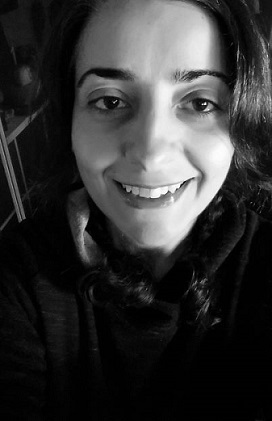 Yolanda Sfetsos
Yolanda Sfetsos
How many unfinished projects do you have on your computer?
OMG. I actually have a bunch of novel first drafts on my hard drive that are begging to be revised and finalised. One of my 2021 goals is to actually start revising them.
Do you write a synopsis first or write the first chapter? If you only write short stories, do you plan your story or let the characters lead you?
No synopsis for me. It always begins with an idea. Sometimes sparked by an artwork, other times by a song or a random thought. Then I start taking a lot of notes and before I realise it, I find myself writing the first chapter.

Were any of your characters inspired by real people?
I don’t go out of my way to base any of my characters on real people, but I think there are qualities and traits from people I’ve known that might wind up becoming part of my characters. Without even realising it, of course.
Is there anything about you your readers might be surprised to find out?
Even though we live in the suburbs, it’s been over five years since I’ve driven a car. Actually, we sold our car about the same time and haven’t had one since.
What is your work schedule like when you’re writing?
When I’m writing, my work schedule is hectic because I throw myself into the story completely. Once an idea grabs me and becomes more, I fall right into the process and get so consumed all I can think about is the story.
Do you set yourself a daily word count?
When I’m working on a first draft, I usually set the daily word count goal of 2-3k. When I’m working on revision, I give myself the goal of 20-30 pages per day.

How do you select the names of your characters? Do you know everything about them before you start writing their story?
Sometimes the names of the characters come out of nowhere, but most of the time I look them up online to find names with appropriate meanings. As far as knowing everything about the character, I usually know a lot but always discover more while writing.

How long on average does it take you to write a book or story?
It all depends on how long the story is, but once I get started, I get lost in a frenzy of words. I can write a short story in one sitting or two, and have it completely revised and done in a week or two. Novellas and novels can take anywhere between two to four weeks to write, not including the revision.
I also like to take a bit of time between projects so that’s why completing the project takes me a while.
Thank you for joining me in the tearoom, Yolanda. If you would like to find out more about Yolanda’s work, please click on the link below:
Twitter: https://twitter.com/yolandasfetsos
Website: www.yolandasfetsos.com
If you want to find out more about Clubhouse Members’ Books, don’t forget to check out the Clubhouse Bookshops, too.
January 21, 2021
Clubhouse Guest’s Chat: Michelle Lane
Welcome to Clubhouse Chat page. Those of you who are not a member won’t be aware that the location of the Clubhouse is shrouded in mystery. The only way to visit it is via membership or an invite to the tearoom. Every few days, I’ll be sharing a conversation with all sorts of writers and authors at different levels of their writing careers. Over tea and cakes, or maybe a glass of something stronger, I shall be chatting with my guest about their work in progress, or latest book release.

Today, I’m chatting to the horror writer, Michelle Lane. Like myself, Michelle is one of the writers featured in the Women of Horror Anthology, Vol 3 The One that Got Away published by Kandisha Press

Michelle. I must start by saying your story theme in The One That Got Away is fascinating and I’m very much looking forward to reading it, but first I must welcome you to the tearoom.
Thank you for the invite, Paula.
Please explain to our audience all about your latest writing project. Is it a new idea, or one you have been mulling over for some time?
My story, “Josephine,” that appears in the Kandisha Press anthology, THE ONE THAT GOT AWAY, was born out of an idea I’ve been thinking about for a long time. I love body horror and at some point, I started seeing a connecting between body horror and pornography. Specifically, how women’s bodies are practically dissected into their parts and fetishized by viewers. I became increasingly interested in how women of color were represented in pornography. I’m not going to go into too much detail about my research so far, mainly because I’m planning to write a nonfiction piece that hasn’t completely solidified in my head. Anyway, I wanted to write a story about a woman of color who is in the porn industry but doesn’t accept the expectations of the filmmakers or the audience. And, I wanted it to be a horror story. So, I added a creepy vampire who essentially stalks her because that’s what vampires do, and I wanted to give him an interesting backstory. I was nervous about submitting the story, because I’m still uncertain about how people will react to the crossing of genres between horror and erotica. The connection seems perfectly clear to me given how women have often been portrayed in horror films and pornography. In my mind, there’s a definite connection.
How many unfinished projects do you have on your computer?
Somewhere in the neighborhood of twenty. I have a paranormal romance series I’ve been working on for several years that I’m hoping will soon see the light of day. I started writing the sequel to my Bram Stoker Award nominated debut novel, INVISIBLE CHAINS. I have another novel about psychics and other paranormal phenomena that is heavily inspired by the band Clutch’s eponymous album. And, I have the beginnings of short stories, snippets of dialog, and other stuff that never took off.
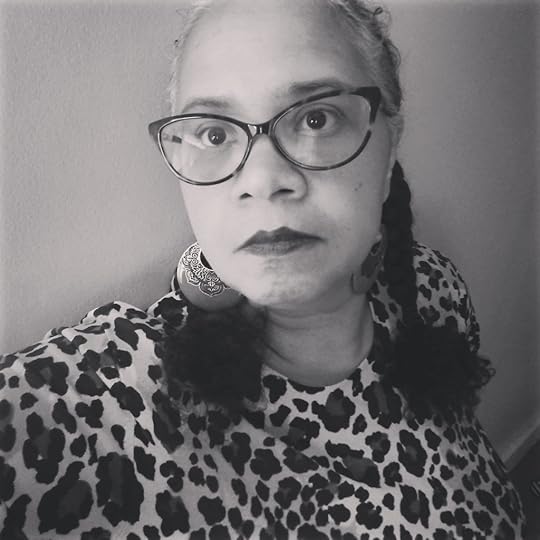 Michelle Lane
Michelle Lane
Do you write a synopsis first, write the first chapter, or if you only write short stories do you plan your story or let the characters lead you?
I’m not a linear thinker. And, I hate writing a synopsis, so I usually leave that until I’m at the end of the story. When an idea comes to me, it usually comes when I’m doing something else – reading, watching a movie, driving, talking to a friend – so my writing process begins from that point. It could be a scene, an exchange of dialog, or just an idea. Sometimes, when I’m driving in my car and a song comes on that makes me want to dance, I often picture characters I’m working on dancing to that song and I gain new insight into their personality. I’m a pantser, so sometimes I drive the story and sometimes the characters do, but I rarely write a piece that starts at the beginning and keeps progressing to the end. Even when I write short fiction, I don’t always know how the story will end and often surprise myself when I finish.
When reading your work through do you ever find that your daily mood swings are reflected in your writing?
Definitely. I write some pretty dark stuff at times and pull from my own emotional trauma at times, so reading some of my work is like a window into my mind on that given day. Sometimes I’m shocked by how emotionally charged my work can be, and it often feels like someone else wrote it.
Were any of your characters inspired by real people?
The vampire in INVISIBLE CHAINS was inspired by a real person. In fact, he has the same name, Carlos Velasquez. Carlos was a pen pal of mine when I was a teenager. He was roughly ten years older than me and obsessed with vampires. I am also obsessed with vampires, so we began a correspondence that lasted over ten years. We collaborated on vampire erotica stories, and I met him in person a few times when I visited New York City. In hindsight, maintaining that kind of connection with a person that much older than me was potentially dangerous. I often joke about the fact that if the Internet existed when I was a teenager, I would probably be dead in a ditch somewhere. I had the bad habit of climbing into cars with strangers, hitchhiking, and writing extremely provocative letters to a man much older than me who literally wanted to drink my blood.
What did you learn when writing your book or story? In writing it, how much research did you do?
INVISIBLE CHAINS is a supernatural slave narrative set in antebellum New Orleans. It’s historical horror fiction so, I wanted to make sure I was getting as many of the details correct for the time period as possible. I spent a lot of time researching everything from clothing, language, food, real place names, customs, publications, and actual accounts of slaves. I wanted to show the horror of slavery and make the setting as real as possible for the reader. I didn’t want to misrepresent the lives of the slaves I wrote about, and I wanted to have concrete examples of actual punishments and torture used by slaveholders. I learned a lot about slavery and the treatment of Black people in the United States and how that history has had a continuous impact on the lives of Black people today.
Is there anything about you your readers might be surprised to find out?
Several of my readers won’t be surprised to know that I’m a huge fan of Duran Duran and would love to figure out a way to incorporate them into a story. I’ve been kicking around some ideas, so that might actually happen sooner rather than later. So, if Simon LeBon is reading this, he should know that he just might end up in some pretty weird situations in one of my stories.
Did you uncover things about yourself while writing your books or stories, whether that be a long forgotten memory, a positive experience etc?
Each time I finish a story, I feel like I know myself a little better. I view writing as a form of self-discovery and because of the subjects and characters I write about, the process is often very cathartic. So, yes. I uncover things about myself while writing all the time, and it has helped me to discover things I had forgotten or buried and writing has helped me to heal some of those wounds.

How many hours in a day do you write?
Not enough. I work full-time and I’m a single parent. I just reread an article Gabino Iglesias wrote for Lit Reactor a few years ago, “7 Ways to Turn Your Writing Resolutions into Realities,” and was reminded that I need to make more time for my writing because it’s important to me. I try not to use being a working single parent as an excuse not to write, but I’m raising a high-functioning autistic teenager alone and there are days that I am just too damn tired to write. But it is constantly in the back of my mind and it drives me crazy when I’m not writing. So, on the days I’m no drag-ass tired, I need to be writing at least 500 words instead of scrolling through social media or numbing out by playing a stupid game on my phone. On a good day, I can crank out 1000 words or more. I wanted to argue with the article the first time I read it, but I respect Gabino as a writer and he’s not wrong. If you want to be a writer, you have to be writing. All the time. Even if you only write 50 words a day, you’re still getting closer to the end of that story.
What was your hardest scene to write?
Ironically, the hardest scene I had to write, was killing Carlos Velasquez in INVISIBLE CHAINS. Writing that book was emotionally exhausting. There were times I cried while writing certain scenes or had to take a break and do something else after spending hours researching how horrific humans can be to each other. But the most difficult scene for me to write was killing my antagonist. I had to write the scene at least three times and my mentor kept encouraging me to make his death more intense and my protagonist had to be the one to kill him. So, I needed to pull from my own strength to make her strong enough to face her abuser. My mentor even wrote me a poem giving me ideas about how to kill the vampire using Paul Simon’s “50 Ways to Leave Your Lover” as inspiration. Hence, “50 Ways to Kill Your Vampire.”
Thank you for join me in the tearoom, Michelle. If you would like to find out more about Michelle’s work click on the links below:
Blog: Girl Meets Monster: https://michellerlane.com/
Amazon author page: https://www.amazon.com/~/e/B07Q7XSJR5
If you want to find out more about Clubhouse Members’ Books, don’t forget to check out the Clubhouse Bookshops, too.

